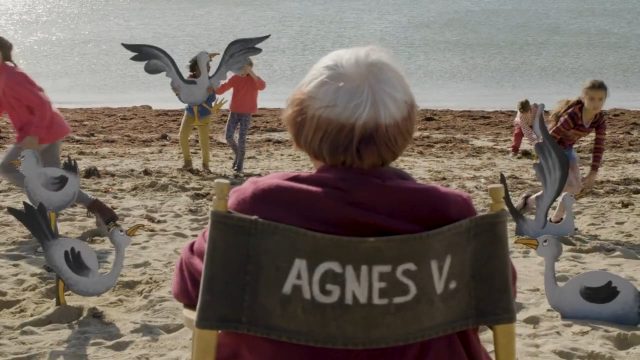TIFF 2019: Varda by Agnes, by David Bax

The opening titles of Agnès Varda’s final film, Varda by Agnès, are backdropped by stills from her films; there are beaches, gleaners, couples in the throes of happiness, etc. So, if you didn’t know beforehand, you’d realize pretty quickly that this is another career retrospective from the late master. In a sense, she’s been here before with 2008’s The Beaches of Agnes. But where that brilliant entry hewed close to the personal and autobiographical, Varda by Agnès is perhaps the closest thing the playful and instinctive Varda has ever come to being academic. That doesn’t mean it’s not a ton of fun, though.
Varda by Agnès‘ backbone is a series of filmed talks Varda gave at museums about her career. She doesn’t lean overly heavily on that footage, though. Traveling loosely chronologically (with occasional jumps backward, like the section on her early career as a photographer), she takes us through her professional life with an emphasis on filmmaking logistics and technology. The section on the newfound freedom digital cameras gave her made my Dogme 95-loving heart sing.
Varda’s convention-eschewing prankishness provides some of Varda by Agnès‘ biggest chortles. When Varda, onstage, introduces a clip from Cleo from 5 to 7, we actually first see a clip from The Beaches of Agnes further contextualizing the Cleo clips that we do eventually get to. Later, when we get to 1988’s enchanting Jane B. for Agnes V., we see an older clip of Varda describing how, in her appreciation of Jane Birkin, she didn’t want to make one of those tributes with clips and interviews, an ironically accurate description of the movie we’re currently watching.
If all this cuteness and laughter is too much for you, though, Varda by Agnès also represents, in some chapters, a return to a more overtly political Varda than we’ve seen in the 21st century. If, for some reason, you couldn’t hang with Beaches‘ deeply personal bent or with the unrelenting love and humanism of Faces Places, you’ll be heartened by Varda’s unequivocal takes on, for example, reproductive rights in the section covering 1977’s One Sings, the Other Doesn’t.
Varda’s not the only one up on stage or in the film’s other newly produced material. Some of the most illuminating bits feature her in conversation with collaborators like Nurith Aviv, who was her cinematographer for most of the 70s and 80s, or with the great Sandrine Bonnaire, who masterfully played the lead role in Vagabond at only seventeen years old. Varda was always collaborating and it’s fittingly contrarian that Varda by Agnès, the final film from one of cinema’s all time greatest auteurs, makes such an open-armed anti-auteurist argument.
























